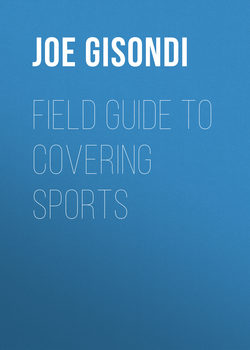Читать книгу Field Guide to Covering Sports - Joe Gisondi - Страница 18
На сайте Литреса книга снята с продажи.
Clerking Is a Great Way to Learn
ОглавлениеMany newsrooms have high school or college students working as clerks on the sports desk. They take scores by phone from coaches. They ask questions about key plays and players. And they write. By the end of the night, a clerk may knock out more than 10 short game stories.
And by the end of a month, clerks will have honed their skills and increased their speed, making it much easier to develop a single story on deadline.
Clerking enables younger reporters to write tight, concise stories. “Cover the game or write a feature, but it’s tough to do both at the same time,” says Jim Ruppert, longtime sports editor for The State Journal-Register in Springfield, Illinois.
Typical game stories focus on action at the end of the game first, because these later plays are usually most significant or most memorable. Sometimes, writers leap around, focusing on key plays as they relate to trends: a pitcher inducing several double plays or a football team making several defensive stops. Usually, plays are described when they define a trend, spark a rally, address an unusual circumstance, illustrate a storyline, or change the momentum in a game. Writers, though, never record the game from beginning to end.
“The game story should tell you a little about the status of each team and the thoughts and emotions of the coaches and key players who made tonight’s events happen,” says Art Kabelowsky, assistant sports editor for the Wisconsin State Journal. “Anecdotes and good quotes are better than play-by-play.”
Tell the story through the eyes of those involved. Interview as many athletes as possible. Let the reader see the plays evolve through the athletes’ eyes. And complement these descriptions with your own astute observations. Of course, that means taking detailed and copious notes.
Plus, take chances. Be creative. Borrow ideas from other writers.
Ultimately, your success relies on preparation—research and detailed observation—even if you shift gears to a new main theme on deadline. “Have an idea what might be the story,” says Rich Chere, hockey beat writer for The Star-Ledger in Newark, New Jersey. “But very often that does not turn out to be the post-game story. Be flexible. You cannot stick with your assumed story if something more interesting or important happens.”
Sports Insider: On Drama
I’m something of an accidental tourist in sports writing. I got bachelor’s and master’s degrees in print journalism but always envisioned myself as a news reporter or perhaps, a business reporter. The first job I was offered was in features copy editing. I took it, because it was at a good newspaper where I had interned as a reporter. Within a year, they offered me a reporting position—covering high school sports. For the first couple years, I didn’t see myself remaining a sports reporter for long. But over time I realized I enjoyed the inherent drama involved (some-one wins, someone loses), the life stories, and the freedom sports reporters have to really develop their own writing style. These are the things that keep me going still today.
Vicki Michaelis, USA Today
